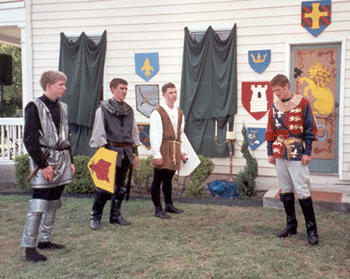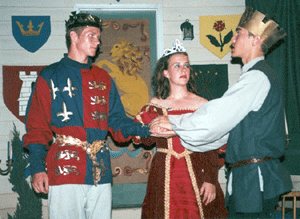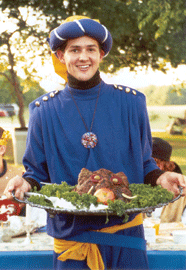The Medieval Feast was the culminating show-and-tell event for my KONOS History of the World II students. There was much planned for the main event that would begin at 5 PM when all the parents arrived. What we were attempting was so massive... feed 125 people a medieval dinner, perform not one but two Shakespeare plays, and demonstrate all that we had learned throughout the year! Ridiculous! I wondered if it would all come together.
Preparing the Atmosphere
Mothers had been busily buzzing through the house the entire day helping students prepare the menu as well as setting up and decorating tables on the lawn for the feast. Our guest list had grown to about 125 as grandparents, cousins, and friends were included. My house was quickly outgrown, so the feasting tables were moved to the side lawn. With so many tables we were fast running out of our combined stash of silver candelabras and silver serving pieces.
 The menu of meat-loaf boar's head, baked potatoes, carrots, salad, and cherry tarts was simple enough; there was just so much volume! Fortunately, we had purchased our bread to make trencher plates from the medieval bakery called Sam's and were not baking it ourselves! The authenticity of the meal would make clean-up a breeze. The plates would be consumed, the guests would eat with their fingers, so no silverware need be washed, and the dogs would feast on leftovers thrown on the ground.
The menu of meat-loaf boar's head, baked potatoes, carrots, salad, and cherry tarts was simple enough; there was just so much volume! Fortunately, we had purchased our bread to make trencher plates from the medieval bakery called Sam's and were not baking it ourselves! The authenticity of the meal would make clean-up a breeze. The plates would be consumed, the guests would eat with their fingers, so no silverware need be washed, and the dogs would feast on leftovers thrown on the ground.
The stage, which was usually my living room, had to be moved outside as well. The balcony on the front of the house would be great for Romeo and Juliet, but the side of our house where Henry V was to be performed was anything but medieval looking. I pow-wowed with my moms. The shields each student had designed for heraldry were taped to the side of the house and a large lion was painted on cardboard to cover the glass paned door. But the windows still looked very un-medieval. Then one of the mothers volunteered some "nasty green polyester fabric" which provided perfect window draping! Tah dah! Instant medieval backdrop!
 Fashioning the Program
Fashioning the Program
Our year had been filled to the brim with papers, literature, history, and Bible; however, those were not the things one could demonstrate for an audience. Needlework segments of the Bayeux Tapestry, stained glass projects, illuminated manuscripts, and drawings of Romanesque and Gothic cathedrals displayed students' artwork endeavors, while large, detailed maps displayed their geographic acumen. The more tangible, demonstrate-able things were the fun activities that had given the real flavor of the Middle Ages to the students. Archery, fencing, Gregorian chants, and English country dancing had thrust us back in time. Plus students had loved every minute of scoring "stabs" on each other in fencing and whirling each other in dancing. With gusto, they demonstrated each of the activities and then asked the parents to join in the dancing.
Instilling Poise
Next came our plays. The students had practiced diligently, but both plays were highly dramatic. We had added music and a very necessary sound system on the performance day, since we were outside. With only a halfway run-through with the mikes, I shuddered to think of the absurdity of using six microphones on six people with zero practice. This would be a real test of poise.
Poise is a manner, a presence, a way of carrying or handling of one's self with grace and dignity no matter what the situation. A poised person emits confidence. How can a teacher take unsure, tentative teenagers with hormone swings and fragile egos and give them poise? By having confidence in each student's ability to accomplish, the teacher gets the self-confidence ball rolling. I hammer on my students, "Sit up." "Hold your head up." "Walk with dignity." "Remember who you are." I never entertain the idea that anything is too difficult or unattainable for them.
Second, acting poise is taught by breaking acting movements into tiny bite size pieces. I constantly tell students what to do with their hands, their feet, their heads, and their voices. I remind them that certain movements show force, other movements show doubt, and still other movements show supplication. I demonstrate how to speak with anger, pity, gentleness, and sarcasm. Working on all the little individual parts, makes the whole attainable. That principle is true for everything taught. Great teaching is instructing in bite-size pieces and teaching poise is no different.
Third, poise begins at the kitchen table. Wise teachers do not require first graders to quote Hamlet; rather, first graders begin to build poise by showing Daddy how a sound wave travels through the ear they built under the dining room table. Children develop poise by first performing small, impromptu show-and-tells in the presence of their family where they feel comfortable. As children grow older, the audience size grows larger, the parts become longer, and poise increases.
 Shaping Personality and Confidence
Shaping Personality and Confidence
Some people are born with a dynamic personality and others are just shy, right? It is true each person is born with personality tendencies, but personality can be trained into children as well as modeled for them. Once you have donned your mom's or Mrs. Hulcy's old dress with tights to look like a medieval Englishman, simply walking up to a stranger and introducing yourself wearing regular attire hardly seems difficult! Personality is really about how interested you are in others and how at ease you make others feel, not how self-conscious you feel. I had to smile at William as he walked around serving the boar's head in my old purple dress, refashioned as a medieval tunic. He hammed it up, and everyone loved him. What confidence!
But, before you can make others feel at ease you must be at ease yourself. Small "Barnum and Bailey" style performances in the living room create a sense of ease and help shape an outgoing personality. That fact was brought home to me as the Henry V performance progressed. I watched as one of the students delivered a flawless speech with a perfect Welsh accent. My mind flashed back two years to the first time this student turned in a paper to me. Each student was supposed to write what he or she wanted to improve in. James failed to put down what he wanted to improve in; instead, he wrote, "Please do not ever make me get up in front of people." What music that Welsh brogue was to my ears and heart.
 Passionate Enthusiasm
Passionate Enthusiasm
At the beginning of this year I told my high school class they had no passion, no boundless enthusiasm, no zeal, no zest. "Why do we need passion or enthusiasm?" they queried. I pointed to two dynamic Bible teachers who pastor in the Dallas metroplex: Chuck Swindoll and Tony Evans. Both men are known nationally for their dynamic and passionate proclamation of the gospel. Both men create an energy when they preach. If they were not passionate and enthusiastic about their message, who would listen to the truth they proclaimed? Of course, the message is of primary importance and, God is in control of who hears, yet the delivery of the message, which is the responsibility of the deliverer, can woo people or turn people away. Passion can be a powerful tool.
To develop passion in my students for the medieval period, we had spent the year studying people of passion. Becket passionately defied his king and defended the church. Joan of Arc passionately roused the French to arms against the English. Henry V, according to Shakespeare, rallied the English with his Saint Crispian's Day speech. As I listened to Jim in the role of Henry V deliver this speech, music welled in the background. His voice grew louder. I looked around at the misty-eyed parents... misty because they were moved by Shakespeare's stirring words and proud of Jim's stirring performance.
From Henry V to Romeo and Juliet, the evening was a stellar success... not just because the performances were excellent, but because of the growth that had occurred in the students through the year.
Slowly the passion, the boundless enthusiasm had emerged. Perfect poise, dynamic personality, and powerful passion... all learned in the living room of a home. I smiled. What a privilege to teach minds and train hearts. What a privilege to see students challenged and rise to the occasion. What a privilege to be a part of the growth of the next generation.